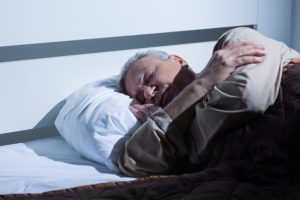Why Do Seniors Have a Harder Time Sleeping?
You may have heard that older adults don’t need as much sleep as they did when they were younger. However, the National Sleep Foundation says that is a myth. People’s sleep needs remain constant throughout their adulthood. It is true, though, that seniors often have a more difficult time getting to sleep and remaining asleep than younger people. Research has shown that about half of all older adults say they have some difficulty with sleep. The problem with not sleeping well goes beyond simply feeling tired for older adults. A good night’s sleep is necessary for the body to repair damaged cells, keep the immune system running well, and to aid in concentration and memory.
Factors That Affect Sleep
A change in sleep patterns is normal as a person ages. Sleep is a cycle with many stages that repeats itself several times of the course of a night. Seniors tend to remain in the lighter stages of sleep for more of the night rather than entering into deep sleep.
The circadian rhythm, or internal body clock, changes, too. As a result, older people often get tired sooner in the evening and wake up earlier in the morning than younger people. This doesn’t necessarily mean they get less sleep, just that their sleep cycle is shifted.
These normal changes don’t necessarily mean that your parent has a sleep disorder. However, if you or your parent’s elder care provider notice symptoms of a sleep problem, your parent should see a doctor. Symptoms of sleep problems include:
- Not feeling refreshed in the morning.
- Irritability and sleepiness during the day.
- Difficulty concentrating.
- Problems falling asleep even when they are tired.
- Trouble staying awake during the day.
- Difficulty going back to sleep if they wake during the night.
Tips for Helping Your Parent Sleep Better
Because sleep is so important to seniors, helping your parent to sleep better could improve their overall health and quality of life. Here are some ways you or your parent’s elder care provider can do to ensure your parent gets the sleep they need:
- Limit daytime naps to 30 minutes. Sometimes a nap can be refreshing, but if your parent sleeps too long during the day, they may not be able to sleep at night.
- Be sure your parent gets enough physical activity during the day. Staying active can help your parent to feel more tired at night. Ask your parent’s elder care provider to engage your parent in physical activity during the day, such as walking, gardening, or exercising.
- Ask the doctor to review the medications your parent is taking. Certain medications can interfere with sleep.
- Limit caffeine intake, especially in the evening.
If you or an aging loved one are considering elder care in Bay Shore, NY, please contact the caring staff at Family First Home Companions. Serving all of Long Island. Call today: (631) 319-3961
Sources:
https://sleepfoundation.org/sleep-topics/aging-and-sleep
http://www.webmd.com/sleep-disorders/features/when-older-folks-cant-sleep#1
- Caregiver of the Month: Kathy - April 8, 2022
- Preventing Colds and Flu in Springtime - March 2, 2022
- Caregiver of The Month: Jacqueline B - February 21, 2022

